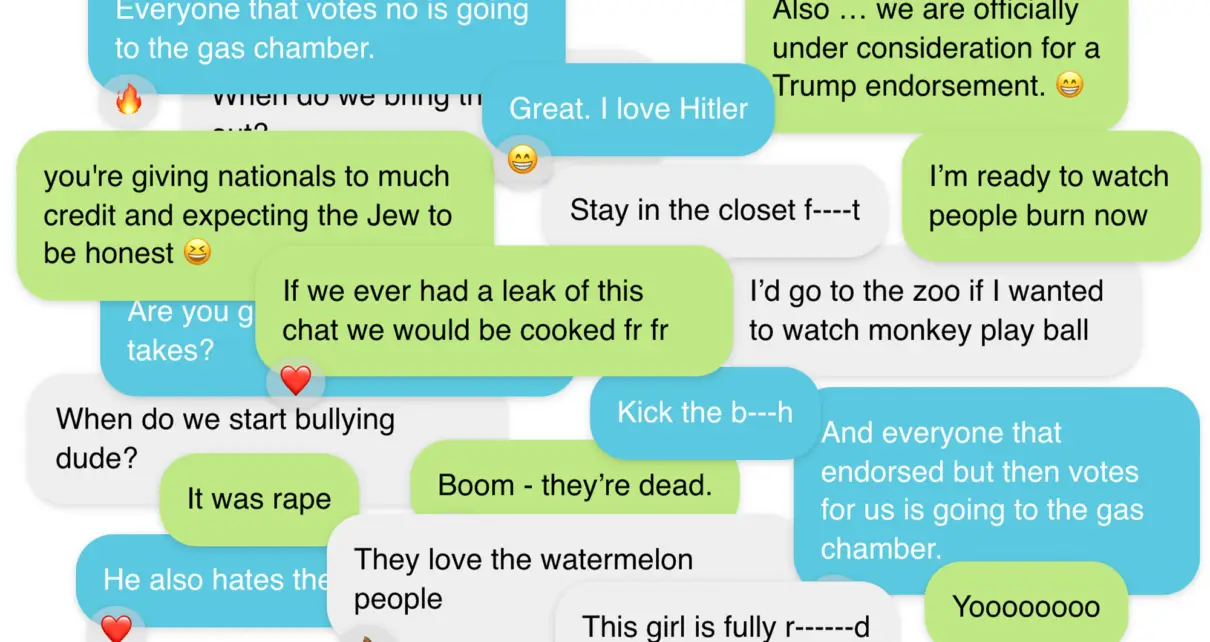In mid-October of 2025, Politico published roughly 2,900 pages of messages from a private Telegram chat called “RESTORE YR WAR ROOM.” The chat, created in January by Peter Giunta, former chair of the New York State Young Republicans, aimed to rally support for his bid to lead the national Young Republicans federation. Over several months, it drew more than 400 members from Young Republican chapters in New York, Kansas, Arizona, and Vermont and produced what Politico described as a blur of slurs and violent fantasies. Participants joked about rape, praised Adolf Hitler, and referenced gas chambers, according to Al Jazeera, while Kansas’ Young Republicans chair Alex Dwyer posted the neo-Nazi code “1488” into the conversation, according to Kansas Reflector. In the same Politico report, the team spent months verifying the messages before publication, which prompted shock among mainstream party leaders and attracted bipartisan condemnation.
Besides Giunta, the chat included prominent state figures such as Annie Kaykaty (New York national committee member), Bobby Walker (who would later replace Giunta as New York State Young Republicans chair), Joe Maligno (general counsel for the New York group), Kansas vice-chair William Hendrix, and Vermont state senator Samuel Douglass, according to Kansas Reflector. Also participating was Michael Bartels, a senior adviser at the U.S. Small Business Administration. Bartels later testified that Gavin Wax, president of the rival New York Young Republican Club, had pressured him to release the logs, according to Al Jazeera. Giunta publicly accused Wax of orchestrating a “character assassination,” while some participants suggested the leaked messages had been doctored or taken out of context, according to CBS News. While Politico has not revealed its source, speculation suggests internal disputes among New York and Kansas Young Republicans may have led whistle-blowers to forward the content to reporters.
The revelations prompted swift organizational punishments. New York Republican county chairs voted unanimously to disband the New York State Young Republicans and revoke its charter, according to CBS News. Nassau County party chairman Joseph Cairo called the racist remarks “disgraceful, disgusting,” adding, “They should be totally excluded from the Republican party because they do not represent what the principles or beliefs of our Republican Party are,” according to CBS News. The group’s social media profiles were subsequently scrubbed and its functions suspended. In Kansas, the state GOP deactivated the Kansas Young Republicans chapter after learning that Chair Alex Dwyer and Vice-Chair William Hendrix had participated, and Hendrix was promptly fired from Attorney General Kris Kobach’s communications staff, with Kobach calling the comments “inexcusable,” according to Kansas Reflector. In Vermont, pressure from Republican leaders, including Governor Phil Scott, forced Sen. Samuel Douglass to resign. Douglass apologized and stated he stepped down after receiving threats against his family, according to The Guardian. Ultimately, PBS.org reported that eight of the 12 chat participants identified by the media lost their jobs, and several others had job offers rescinded.
Nationally, Democrats quickly condemned the messages. New York Governor Kathy Hochul urged immediate consequences, stating, “Kick them out of the party. Take away their official roles. Stop using them as campaign advisers… There needs to be consequences. This bullshit has to stop,” according to a PBS NewsHour report. Speaking on the Senate floor, Senate Majority Leader Chuck Schumer described the chat as “revolting” and called for Republicans, including President Donald Trump and Vice President Vance, to “condemn these comments swiftly and unequivocally,” as recounted in the same CBS NewsHour report.Condemnation also came from within the GOP. New York Assemblyman Michael Lawler and state Senate Minority Leader Rob Ortt called for the resignations of the two, according to CBS News. House Speaker Mike Johnson stated that such extremism had no place in the party, telling CBS News, “We roundly condemn any of that nonsense,” while insisting the participants did not represent the broader GOP. Reactions also came from high-ranking officials, most prominently Vice President JD Vance. After the Politicos’ initial report was published, Vance posted a screenshot of text messages between himself and Jay Jones, the Democratic candidate for Virginia’s attorney general race, on X, including a message from Jones suggesting a prominent Republican get “two bullets to the head.” On The Charlie Kirk podcast, he dismissed the uproar stating that the participants were “kids telling edgy, offensive jokes,” and later on The Charlie Kirk podcast, saying, “I really don’t want us to grow up in a country where a kid telling a stupid joke, telling a very offensive stupid joke, is cause to ruin their lives,” according to Al Jazeera and ABC News. At this time, the White House has not issued an official statement on the matter.
To gauge the implications beyond the headlines, The Outlook spoke with Ken Mitchell, Ph.D. and Chair of Monmouth’s Political Science and Sociology Department. Mitchell argues the scandal doesn’t reveal much new about youth political culture. “College students and young politically active people express passionate praise of their side and ruthless, distorted judgment of the other side,” he said. Having studied in London, Mitchell recalled “loads of harsh, inflammatory commentary” and doesn’t believe today’s partisan youth are necessarily more extreme.
If anything, he suggests Generation Z might be less politically engaged overall and potentially less polarized than commonly perceived. “Gen Z voters, more than earlier generations, are registered Independents. Many students feel alienated from both major parties. My sense inside and outside MU is that Gen Z views both parties as fundamentally untrustworthy and indeed hostile to the interests of young people,” he explained, citing issues like tuition costs and climate change where students often feel ignored.
Mitchell also challenged the idea that scandals like the group chat leak significantly shift public trust in the long run. He noted that surveys show that confidence in major institutions, such as courts, parties, media, and universities, has been declining for years. “It is hard to make a case that this leak story moves the needle in terms of public trust overall,” he said, arguing that rising tuition costs and perceived institutional failures likely damage trust more than inflammatory text messages among a small group. Rather than blaming young people for an environment often shaped by older generations, Mitchell urged universities to empower student government and support cross-partisan clubs to foster constructive dialogue. He cited the recent SGA-led protest from this past spring semester against FAMCO at Monmouth, where the Young Democrats and Young Republicans “made signs together, coordinated their protest activities together, spoke in public together,” demonstrating that student collaboration can transcend party labels on specific issues explained Mitchell.
The Young Republican chat leak exposed racist and violent messages exchanged within a youth wing of a major political party. The incident led to organizational shutdowns in New York and Kansas, the firing of participants, and national condemnation, prompting several GOP leaders to distance themselves from the remarks publicly. Mitchell suggests the episode may reflect long-standing political tensions and broader institutional distrust among young people, rather than indicating a uniquely radicalized Generation Z. The aftermath presents Republican Party leaders with the challenge of addressing extremist rhetoric within their youth organizations and raises questions about engaging a generation described by Mitchell as often skeptical of established political parties.



